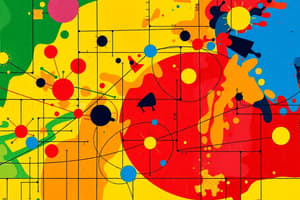Podcast
Questions and Answers
Which of the following best describes the relationship between pure and applied mathematics?
Which of the following best describes the relationship between pure and applied mathematics?
- There is no discernible difference between pure and applied mathematics; the terms are interchangeable.
- Pure mathematics seeks mathematical knowledge for its own sake, while applied mathematics uses it to solve real-world problems. (correct)
- Pure mathematics focuses on practical applications, while applied mathematics is theoretical.
- Pure mathematics is based on experimental science, while applied mathematics relies on deductive reasoning.
Which characteristic distinguishes mathematics from experimental sciences?
Which characteristic distinguishes mathematics from experimental sciences?
- Mathematics rarely involves the creation of models to represent real-world phenomena.
- Mathematics centers on deductive reasoning and rigorous proof rather than experimentation. (correct)
- Mathematics relies heavily on observation and empirical data for validation.
- Mathematics primarily uses inductive reasoning to establish truths.
A researcher is trying to determine the optimal delivery routes for a fleet of trucks to minimize fuel consumption and delivery time. Which branch of mathematics is MOST applicable to this scenario?
A researcher is trying to determine the optimal delivery routes for a fleet of trucks to minimize fuel consumption and delivery time. Which branch of mathematics is MOST applicable to this scenario?
- Topology
- Abstract Algebra
- Number Theory
- Operations Research (correct)
How are conjectures and theorems related in mathematics?
How are conjectures and theorems related in mathematics?
Which of the following sequences represents a progression from a basic to more advanced study within the branch of mathematics focused on quantity?
Which of the following sequences represents a progression from a basic to more advanced study within the branch of mathematics focused on quantity?
Which field of mathematics is most directly concerned with the study of rates of change and slopes of curves?
Which field of mathematics is most directly concerned with the study of rates of change and slopes of curves?
If a business analyst uses game theory to model competitive strategies between companies, which aspect of the situation is game theory helping to analyze?
If a business analyst uses game theory to model competitive strategies between companies, which aspect of the situation is game theory helping to analyze?
What is the primary role of mathematical models in understanding real-world systems?
What is the primary role of mathematical models in understanding real-world systems?
A data scientist needs to analyze a large dataset to identify patterns and trends in customer behavior. Which area of mathematics is MOST relevant to this task?
A data scientist needs to analyze a large dataset to identify patterns and trends in customer behavior. Which area of mathematics is MOST relevant to this task?
In the context of mathematics, what does 'axiomatization' refer to as a trend?
In the context of mathematics, what does 'axiomatization' refer to as a trend?
Flashcards
What is Mathematics?
What is Mathematics?
Abstract study of quantity, structure, space, and change.
What is a Conjecture?
What is a Conjecture?
A statement proposed as true, but without proof.
What is a Theorem?
What is a Theorem?
A proven statement based on axioms or other theorems.
What is a Model?
What is a Model?
Signup and view all the flashcards
What is Arithmetic?
What is Arithmetic?
Signup and view all the flashcards
What is Algebra?
What is Algebra?
Signup and view all the flashcards
What is Geometry?
What is Geometry?
Signup and view all the flashcards
What is Calculus?
What is Calculus?
Signup and view all the flashcards
What is Operations Research?
What is Operations Research?
Signup and view all the flashcards
What is Numerical Analysis?
What is Numerical Analysis?
Signup and view all the flashcards
Study Notes
- Mathematics is the abstract study of topics such as quantity, structure, space, and change.
- The exact scope and definition of mathematics is viewed differently by mathematicians and philosophers.
- Mathematics seeks out patterns and formulates new conjectures.
- Mathematicians prove or disprove conjectures through mathematical proofs.
- Mathematical proofs are arguments sufficient to convince other mathematicians of their correctness.
- Mathematical research is essential in many fields throughout the world, including science, engineering, medicine, and economics.
- Applied mathematics inspires and uses new mathematical discoveries and can lead to new disciplines.
- "Mathematics" comes from the Greek μάθημα (máthēma), meaning "knowledge, study, learning".
- The earliest evidence of mathematics dates back to 30,000 BCE with the discovery of tally marks on bone.
- Mathematical trends include abstraction, axiomatization, and specialization
- Mathematics is essential in the natural sciences, engineering, medicine, finance, computer science, and social sciences.
- Applied mathematics has led to entirely new mathematical disciplines, such as statistics and game theory.
- Mathematicians engage in pure mathematics (mathematics for its own sake) without any application in mind.
- There is an ongoing debate about whether mathematical objects, like numbers and points, exist naturally or are human creations.
- A consensus among mathematicians is that mathematics is not an experimental science.
- Mathematical proof relies on deductive reasoning, fundamental concepts (axioms), and defined terms.
- Mathematics is broadly classified into quantity, structure, space, and change.
Quantity
- Arithmetic studies quantity and numbers.
- Arithmetic starts with natural numbers and progresses to fractions, real numbers, and complex numbers.
- Number theory delves into the properties of integers.
Structure
- Algebra studies structure, focusing on symbols and the rules for manipulating them.
- Algebra includes elementary algebra (solving equations).
- Algebra includes abstract algebra (groups, rings, and fields).
- Algebra includes linear algebra (vector spaces and linear transformations).
Space
- Geometry deals with space, starting with Euclidean geometry (planes, lines, and circles).
- Geometry expands to non-Euclidean geometries, topology, fractal geometry, and trigonometry.
Change
- Calculus studies change
- Calculus includes differential calculus (rates of change and slopes).
- Calculus includes integral calculus (accumulation of quantities and areas).
- Numerical analysis is a branch of calculus used to approximate solutions to problems that are difficult to solve analytically.
Foundations
- Mathematical logic explores the foundations of mathematics.
Mathematical Applications
- Statistics is used to analyze, interpret, and present data.
- Probability theory is the study of random events.
- Probability theory is used in statistics, finance, and other fields.
- Game theory studies strategic interactions between rational decision-makers.
- Operations research uses mathematical techniques to optimize decisions in business, engineering, and logistics.
Mathematical statements
- A conjecture is a statement that is proposed as true, but for which no proof has yet been found.
- A theorem is a statement that has been proven to be true based on previously established statements, such as axioms or other theorems.
- A model is a mathematical representation of a real-world situation or system.
- Mathematics is used to create models that can be used to understand, predict, and control the behavior of systems.
Historical Developments
- Ancient civilizations contributed significantly to the development of mathematics.
- Civilizations like Mesopotamia, Egypt, Greece, India, and China all made contributions.
- The Babylonians developed a sophisticated number system and made advances in algebra and geometry.
- The Egyptians used mathematics for surveying, construction, and astronomy.
- The Greeks developed deductive reasoning and formalized mathematical proofs.
- The Indians developed the decimal number system and made advances in trigonometry.
- The Chinese developed methods for solving algebraic equations and calculating areas and volumes.
Modern Mathematics
- Mathematics continues to evolve with new discoveries and applications being made every day.
- Modern mathematics is characterized by a high degree of abstraction and specialization.
Studying That Suits You
Use AI to generate personalized quizzes and flashcards to suit your learning preferences.




